With the dog days of summer upon us, one of the only ways to stay cool, other than remaining in an air-conditioned room, is to reach for one of Taiwan's many traditional summer drinks.
Many of these beverages are the products of multinational food and beverage companies. But long before these drinks were created, there existed already a wide range of beverages made with fruit or herbs that are healthy, tasty and pleasantly refreshing. With awareness of health issues on the rise, these local drinks are coming back into vogue.
Some of the most popular traditional drinks are preserved plum juice (酸梅湯), bitter tea (苦茶), winter melon tea (冬瓜茶), starfruit juice (楊桃湯) and hsientsao tea (仙草茶), all of which can be found at street-side stalls and shops throughout Taiwan. Many local food companies now package these drinks as well, but for the real thing, you'll have to visit the stalls and traditional family stores.
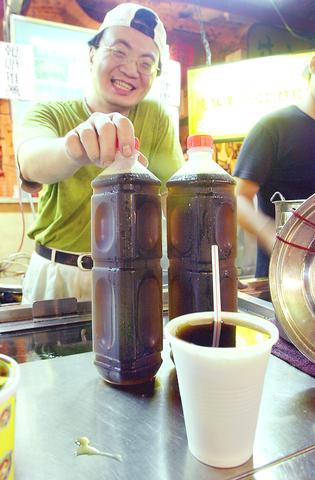
PHOTO: CHEN CHENG-CHANG, TAIPEI TIMES
Hualien - Bitter tea
Bitter tea (苦茶) isn't actually very bitter, as the herbs used to make it provide natural sweetness. Originally, Yuan Chih Tang Herbal Shop (源芝堂青草鋪) was a Chinese herbal medicine wholesaler, but owner Hsu Tsung-jung (許宗榮) switched his focus to the tea business last year.
Bitter tea is made from 18 kinds of herbs and requires complex preparation. Hsu follows a traditional recipe that requires ingredients to be added in two stages, with the cooking process taking up to six hours.
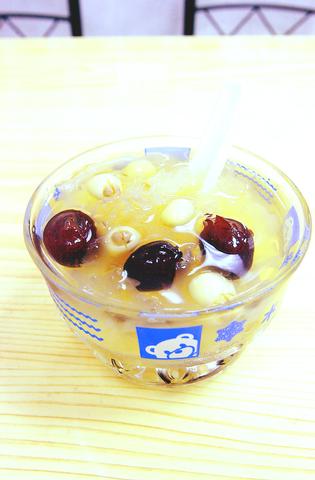
PHOTO: CHEN CHENG-CHANG, TAIPEI TIMES
"And this is just the basic production" Hsu said. The resultant brew still has to be filtered and cooled before bottling.
Yuan Chih Tang Herbal Shop is located at 60 Kuohsing 1st St., Hualien City (花蓮市國興一街60號), tel (03) 831-1825.
Taipei County - Preserved plum juice
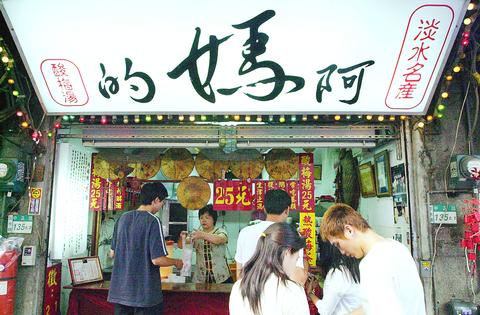
PHOTO: GEORGE TSORNG, TAIPEI TIMES
Grandma's Preserved Plum Juice (
Grandma's Preserved Plum Juice shop retains a traditional exterior and is presided over by Ke Po-wei (
"The secret of making the plum juice was perfected by my grandmother," Ke said. The traditional way of making plum soup is to use green plums from Taoshan (
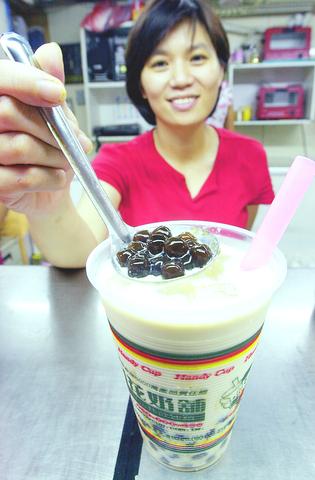
PHOTO: CHEN CHENG-CHANG, TAIPEI TIMES
The drink has proved so popular that Grandma's Preserved Plum Juice has expanded into a chain of stores with a presence all over Taiwan. The drink is good for digestion and is especially effective against the sweltering heat of Taiwan's summers. Over holiday weekends, Ke said the store sells up to 8,000 cups of the drink from their Tamsui stores.
Grandma's Preserved Plum Juice is located at 135-1 Chungcheng Rd., Tamsui township, Taipei County (台北縣淡水鎮中正路135-1號) or 73 Chungcheng Rd., Tamsui township, Taipei County (台北縣淡水鎮中正路73號), tel 2629-0107.
Kaohsiung - Starfruit juice
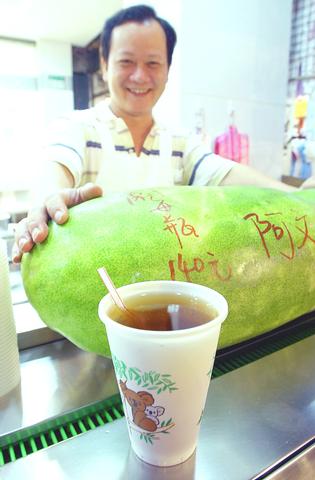
PHOTO: CHEN CHENG-CHANG, TAIPEI TIMES
Starfruit juice is not just a delicious summer drink. It is also regarded as a cure for sore throats and as a beauty-enhancing food.
Kung's Family Starfruit Juice (龔家楊桃湯) in Kaohsiung has been making and selling starfruit juice for 20 years. According to the store's owner, Kung Ching-shou (龔清首), starfruit is grown throughout the year, making supply relatively simple.
To make starfruit juice, the fruit is soaked in a secret preparation for six months, with the resulting mixture saved as a kind of concentrate. Sugar or honey may also be added. "The green or unripe starfruit makes the best soup as the flavor combines sourness, sweetness, saltiness," Kung said.
Kung Family Starfruit Juice is located at 217 Tsoying Ta Rd., Kaohsiung County (
Taipei City - Lotus seeds with jelly fungus
Lotus seeds with jelly fungus soup (
Owner Chen Mei-chu (
Yitung Hsiaochi is located at 66-2 Yitung St. (
Taipei City - Pearl tapioca milk tea
Pearl tapioca milk tea (
A popular chain serving this drink is Moon Flower Cafe (
Taipei City - Hsientaso tea
Hsientsao (
Tanfang Hsientsao (丹芳仙草), located in Taipei's Jaoho Street Night Market (饒河街觀光夜市), has been selling hsientsao products for 11 years. Its hsientsao with shaved ice and hsientsao tea are especially popular during summer.
According to Wang Chi-kuang (王啟光), who runs the stall, the fresh herbs are usually picked after the Mid-autumn Festival each year. The hsiantsao plant is then sun-dried and then stored in a dry, well-ventilated storehouse for half a year to a year. This is done "so we can stew out the scent from the herb" Wang said.
Wang said the hsientsao products sold by Tanfang are free of artificial additives, so the drink made from the herb is completely natural and very healthy.
Wang also created hsiantsao milk tea (
Tanfang Hsientsao is located at Lane 194, Jaoho St., Taipei City (
Tainan - Winter melon tea
Traditionally, one of Taiwan's most popular summer drinks was winter melon tea (
To prepare winter melon tea, the winter melon must first be sliced and cooked. The cooked melon is mixed with sugar and cooked further until the mixture turns golden brown. The mixture is allowed to harden into blocks. Most people use this pre-prepared mixture to make winter melon tea, which, according to Lin, makes a tastier tea than simply stewing the melon. The shop also sells candied winter melon (
Yifeng Winter Melon Factory is located at 212 Yungfu Rd., Sec. 2., Tainan City (

June 9 to June 15 A photo of two men riding trendy high-wheel Penny-Farthing bicycles past a Qing Dynasty gate aptly captures the essence of Taipei in 1897 — a newly colonized city on the cusp of great change. The Japanese began making significant modifications to the cityscape in 1899, tearing down Qing-era structures, widening boulevards and installing Western-style infrastructure and buildings. The photographer, Minosuke Imamura, only spent a year in Taiwan as a cartographer for the governor-general’s office, but he left behind a treasure trove of 130 images showing life at the onset of Japanese rule, spanning July 1897 to

One of the most important gripes that Taiwanese have about the Democratic Progressive Party (DPP) is that it has failed to deliver concretely on higher wages, housing prices and other bread-and-butter issues. The parallel complaint is that the DPP cares only about glamor issues, such as removing markers of Chinese Nationalist Party (KMT) colonialism by renaming them, or what the KMT codes as “de-Sinification.” Once again, as a critical election looms, the DPP is presenting evidence for that charge. The KMT was quick to jump on the recent proposal of the Ministry of the Interior (MOI) to rename roads that symbolize

On the evening of June 1, Control Yuan Secretary-General Lee Chun-yi (李俊俋) apologized and resigned in disgrace. His crime was instructing his driver to use a Control Yuan vehicle to transport his dog to a pet grooming salon. The Control Yuan is the government branch that investigates, audits and impeaches government officials for, among other things, misuse of government funds, so his misuse of a government vehicle was highly inappropriate. If this story were told to anyone living in the golden era of swaggering gangsters, flashy nouveau riche businessmen, and corrupt “black gold” politics of the 1980s and 1990s, they would have laughed.

In an interview posted online by United Daily News (UDN) on May 26, current Chinese Nationalist Party (KMT) Chairman Eric Chu (朱立倫) was asked about Taichung Mayor Lu Shiow-yen (盧秀燕) replacing him as party chair. Though not yet officially running, by the customs of Taiwan politics, Lu has been signalling she is both running for party chair and to be the party’s 2028 presidential candidate. She told an international media outlet that she was considering a run. She also gave a speech in Keelung on national priorities and foreign affairs. For details, see the May 23 edition of this column,